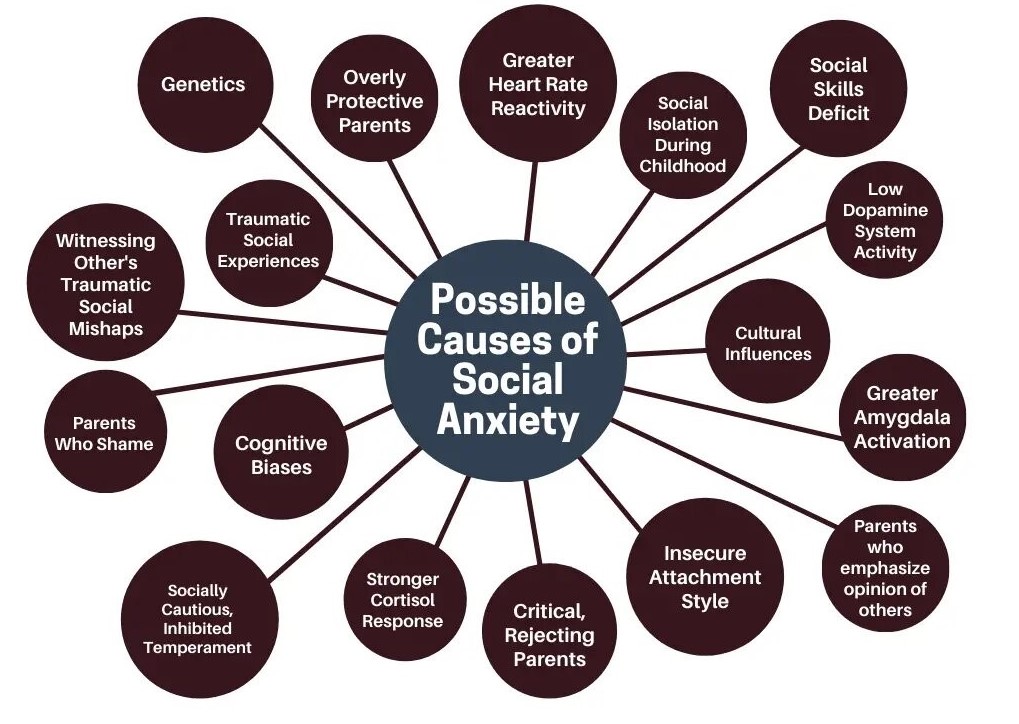By Revda Selver
University is a time of growth, discovery, and new opportunities. However, for many students, it can also be a time of stress, anxiety, and uncertainty. With the pressure to perform academically, making new friends, and planning for the future, it is no wonder that university students are at a high risk for developing anxiety. According to recent studies, over 50% of university students experience some form of anxiety, making it a prevalent and important issue to address.
In this article, we will explore the contributing factors to anxiety among university students, the signs to look out for, and practical strategies for overcoming these challenges and thriving in university. Whether you are a student, a lecturer, or simply interested in the well-being of those around you, this article aims to provide insight and support for navigating the ups and downs of university life.
Dr. Jamilah Hanum Binti Abdul Khaiyom, a lecturer and Clinical Psychologist in the Department of Psychology, AHAS Kulliyyah of Islamic Revealed Knowledge and Human Sciences, International Islamic University Malaysia (IIUM) was interviewed recently to help better understand why university students are suffering from anxiety and to suggest ways on how to approach and support a person who might need help.
What are the most common contributing factors to anxiety among university students in Malaysia?
Dr. Jamilah explained that there are many associated factors to anxiety. For starters, being born in rural areas makes an individual more vulnerable than others to anxiety. Academic stress, family expectations, lecturers’ expectations, and being overly active in co-curricular programs are all factors contributing to anxiety among university students in Malaysia. Based on the literature review she highlighted that medical students are œa very famous population when talking about anxiety and depression. As the nature of their study and the pressure they go through during their education is enormous. History of childhood abuse and severe psychological problems such as stress and depression are considered as contributing factors to anxiety during adulthood if not addressed properly and in time. She added that anxiety is closely related to stress and depression, as people who suffer from anxiety may end up developing depressive disorders.

What are the factors affecting anxiety levels among university students?
œEveryone is unique, said Dr. Jamilah. Even if we are born into the same family, our individual experiences and environment shape our perspective and view of life. This can also affect our level of anxiety, which can be influenced by our own understanding of mental health and our ability to identify symptoms of stress or mental disorders. Some people have higher mental health literacy and know how to take care of their mental health by seeking help from professionals or by using self-assessment tools like the Depression, Anxiety and Stress Scale. On the other hand, those with lower mental health literacy may not fully understand the importance of their mental health and may resort to harmful coping mechanisms like substance abuse.
Who is more prone to anxiety and why?
Adverse childhood events, such as abuse, can be a significant predictor of anxiety disorders during university life. How someone experiences adverse childhood events can vary, and their background and socioeconomic status can also play a role in their understanding and perception of mental health. For example, people in rural areas may attribute mental health issues to supernatural causes and seek help from spiritual healers instead of mental health professionals. This highlights the importance of understanding the contributing factors to mental health and seeking the appropriate resources and support. œIt all goes back to the contributing factors that we have mentioned earlier, she added.
What sort of anxiety-related interventions or strategies do university students find helpful in reducing their anxiety?
Dr. Jamilah told IIUMToday that based on her research, clinical work, and observations, simple self-care practices can be effective in managing anxiety. Good sleep hygiene, physical activity, and adequate water intake are all crucial for managing physiological sensations and emotions associated with anxiety. For example, 20 to 30 minutes of walking can release “happy hormones” such as endorphins and serotonin and improve one’s overall mood. Eating a balanced diet with carbohydrates, protein, and fiber can also have a positive impact on mental health. In addition, incorporating relaxation exercises like deep breathing or mindfulness practices can help to regulate breathing and increase feelings of calm. These simple and easy-to-implement self-care practices can be a helpful first step in managing anxiety.
What sort of anxiety-related interventions or strategies do university students find not helpful in managing their anxiety level?
œSometimes the issue isn’t with the strategies, but rather with the mindset of my students or clients, she said. They might think that these strategies, such as walking for 20 minutes, will provide an instant solution to their anxiety. This expectation of immediate results may hinder the progress they are making. She has noticed that when people are struggling with emotions, they tend to look for a quick and easy fix. However, this kind of thinking can be counterproductive, and it can make them focus on the lack of good results rather than the journey. It is important to give oneself time to adjust and to understand that it takes time to see the benefits of these self-care strategies. It is a slow process, and one must be patient and persistent with it, Dr. Jamilah urged.

Who are viewed as helpful to university students with anxiety in terms of managing their anxiety better?
There is a lot of overlap between spirituality and mental health, and many people find comfort in turning to their religious leaders or œbomoh traditional healer, in Malay, for help with their mental health problems. She further explained that in some cultures, seeking help from a religious healer may be seen as a more acceptable first step before seeking help from mental health professionals. Dr. Jamilah pointed out that the collaboration between mental health professionals and religious leaders can be beneficial in promoting better mental health outcomes and in reducing stigma surrounding mental health issues. By equipping both with knowledge in their respective fields, they can work together to provide comprehensive support to individuals in need. It is important to note that while spirituality can be a source of comfort and support, it is also important to seek professional help when needed, especially if symptoms persist or become severe.
Seeking help from both religious leaders and mental health professionals can provide a well-rounded approach to managing mental health concerns. The combination of spiritual and psychological support can help individuals gain a sense of comfort and peace in their journey towards recovery. It is also important to understand that mental health struggles are not a punishment from a higher power, but rather a result of the complex interplay of biological, psychological, and environmental factors. œSeeking help and treatment is a sign of strength and a step towards self-care and better mental health, she stressed.
Do you believe that counselling services on campuses, especially in the IIUM, are enough to address the mental health problem?
œI would suggest that the university consider recruiting more clinical psychologists and counsellors, she answered. It is important for universities to provide accessible and comprehensive mental health services for their students. By having more clinical psychologists and psychiatrists in universities, students can receive timely and effective treatment for any mental health concerns they may have. Preventive programs and workshops are also valuable in raising awareness and in educating students on how to maintain their mental well-being, but it is equally important to have professionals available to address any issues that may arise. œIt’s good to hear that your own university has already taken steps in this direction, and I hope that it will continue to prioritise and invest in the mental health and well-being of their students, she added.
The Malaysian ministry of health announced many initiatives such as the œNational Strategic Mental Health Action Plan 2020-2025. If we know the importance of mental health and we recognize mental illnesses, why are our university students still suffering in silence?
Dr. Jamilah agreed that there are several factors contributing to the high rates of stress and mental health issues among Malaysians. The stigma surrounding mental health, the fast-paced and demanding environment, and the lack of adequate rest and self-care are just some of the contributing factors. She highlighted that it is important to continue the efforts of the government and mental health professionals in addressing these issues and raising awareness about the importance of mental health. Additionally, it is also important for individuals to take responsibility of their own well-being and to seek help when they need it, without shame or stigma. Breaking down the barriers to seeking help is crucial in addressing the mental health crisis.

As a specialist, what do you suggest for students and universities to better contain the mental health problem?
Improving mental health literacy is crucial in creating a more supportive and understanding society. By increasing our knowledge about mental health, we can reduce the stigma associated with mental disorders and encourage more people to seek help. Dr. Jamilah mentioned four key steps: obtaining and maintaining good mental health, understanding mental disorders and their treatments, reducing stigma, and enhancing help-seeking efficacy, which are all important steps in this direction.
It is also important to emphasize the role of self-care in promoting good mental health. Taking care of our physical and emotional well-being through activities like exercise, sleep, and stress management can help prevent the development of mental health problems and support overall well-being. By promoting these healthy habits and by providing resources and support, we can create a more positive and supportive environment for everyone.

Anxiety is a common mental health issue among university students that can significantly impact their academic and personal lives. Improving mental health literacy, reducing stigma related to mental disorders, and enhancing help-seeking efficacy are essential steps to support students in managing their anxiety. Universities and their higher authorities have a critical role to play in promoting mental health awareness and in providing students with the resources and support they need to thrive. By addressing anxiety in a proactive and compassionate manner, we can create a more inclusive and supportive environment for students like me and you and help them reach their full potential. And always remember that your calm mind is the ultimate weapon against your challenges.***
